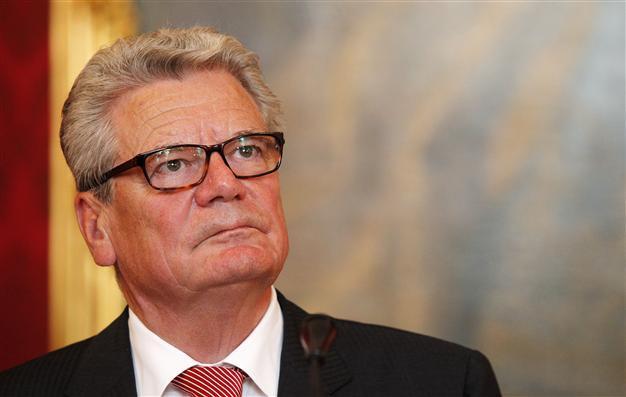Germany marks worst racist violence since war
BERLIN - Agence France-Presse

Germany's President Joachim Gauck. AFP Photo
Germany begins commemorations to mark 20 years since its worst post-war racist violence today, as it grapples with an active neo-Nazi movement that has a political foothold in the former East.
President Joachim Gauck is due to attend events in the northern city of Rostock where a mob of racist extremists besieged and attempted to burn a hostel for asylum-seekers for five days running in August 1992.
The burning building was occupied by Vietnamese who had to be evacuated amid shocking scenes in a country in the throes of reunifying, and shone a spotlight on racist extremism in eastern Germany.
"Everywhere neo-Nazis appear, there will be 10 times more of us than them," Gauck, who hails from the former communist East, has said. He will travel to the Baltic port city Sunday.
As the main port of former East Germany, Rostock was hard hit economically in the aftermath of the fall of the Berlin Wall in 1989 and German reunification a year later, causing the jobless queue to rise daily.
Cut off from the West for four decades, East Germany had scant experience of immigration -- those occasional foreign workers who came from fellow socialist regimes were isolated from the local population.
"It was a very particular era just after the fall of the Berlin Wall. Society was in complete upheaval," Dierk Borstel, an expert on the far-right at Bielefeld University, told AFP.
Germany was also gripped at the time by a debate on the right to asylum, Borstel said, as the war in the former Yugoslavia sparked an exodus of asylum-seekers whose numbers in Germany reached a record in 1992.
Refugees, many of them Roma from Romania, quickly piled into the centre in Rostock, which became overcrowded with dozens of families forced to camp on a garbage-strewn lawn with insufficient facilities.
It was against this backdrop that Rostock made international headlines when on August 22, 1992 a gang of neo-Nazis, to the applause of local onlookers, attacked the centre for asylum-seekers and Vietnamese migrant workers.
Days of violence in the Lichtenhagen district saw several thousand people chanting "Germany for Germans, Foreigners Out!" in ugly scenes not seen in Germany since the Nazi era.
Carrying beer, the skinheads lobbed stones and Molotov cocktails into the immigrant centre while police were under-equipped and disorganised in having to face them and politicians remained silent.
Just two years after reunification, "the worst memories of Nazi pogroms were revived", the regional NDR TV channel said in a documentary dedicated to the riots.
The asylum-seekers were only evacuated after the third night of violence but 120 Vietnamese remained stranded inside the building and only just escaped after it was set on fire by Molotov cocktails.
The photo of a man wearing a tracksuit and the national football team's shirt doing a Nazi salute and standing next to another man, widely smiling, was splashed across the international press.
Since German reunification in 1990, 58 people have died as victims of racist crimes, according to the interior ministry, although German media puts the figure much higher at 149. The National Democratic Party of Germany (NPD), a neo-Nazi political party, has made inroads into the political landscape of eastern Germany where it has members in two regional parliaments.
And the revelation last year of a trio of neo-Nazis, blamed for 10 murders, mainly of Turkish-born shopkeepers between 2000 and 2007, prompted a scandal over the botched probe of the deaths and questions about why officials failed to take the theory of a racist motive more seriously.
Activists from a far-right group rallied Saturday outside a Berlin mosque reputed to be a hotbed of the radical Islamic Salafist community carrying a placard reading "Stop Islamisation" and a caricature of the Prophet Mohammed.
The protest by some 50 militants of the Pro Deutschland group went ahead after a court ruled the cartoons -- blasphemous for Muslims -- were protected as "artistic freedom" and could not legally be considered as abuse of a religious group.
